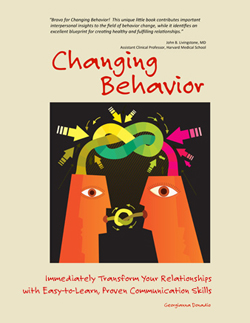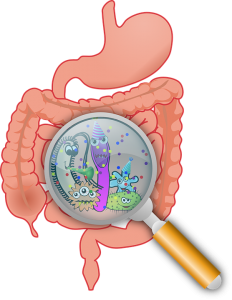By Georgianna Donadio, MSc, DC, PhD-
 All of us, from time to time, identify things about how we behave that we would like to change. Changing our behavior is very difficult because it is the result of the many learned responses we develop as soon as we come into the world. There is research today suggesting that conditioning that can begin even in the womb.
All of us, from time to time, identify things about how we behave that we would like to change. Changing our behavior is very difficult because it is the result of the many learned responses we develop as soon as we come into the world. There is research today suggesting that conditioning that can begin even in the womb.
How we learn to adapt to our environment, what outside events or stimulation feel safe or threatening, how we view the world we live in, what our beliefs and values are, and so forth all play a role in how we learn to behave towards ourselves and others. These factors also influence how we learn to communicate.
The variations of how each of us learns to adapt in the world around us are most noticeable when we are in relationships with others. What behaviors each of us bring to a relationship determines how well, or not, we are able to work together, live together or love together.
An example of how our conditioning impacts our relationships is seen in how couples relate to each other and get along before and after having children together. It is often, after the children come along, that the couple begins to have conflicts that stem from how each of the individuals was raised, what values they have, or what they believe is best for raising a healthy or successful child.
While it is inevitable that we do have conflicts with others because we are uniquely different and uniquely conditioned individuals, there are easy-to-learn, proven communication skills that we can all apply to any of our relationships to make them more fulfilling and positive for both ourselves and others.
A basic and simple skill that we can all apply to our very next encounter to improve our communications with others is putting aside the ongoing conversation in our mind, our concerns of the moment, or what we want to say next, and focusing completely on the individual in front of us and what they are sharing with us. Being fully present to another person shows them that you value and respect them and that you are sincerely interested in what they are feeling, thinking, and communicating with you. This is the basis of the National Institute of Whole Health’s Behavioral Engagement with Pure Presence model.
We all want to be valued and in our fast-paced, electronic-communication world having another person look at us directly while we speak, respond to us with smiles, head nodding or other gestures that let us know they are listening, without their speaking or interrupting us is a wonderfully validating experience that uplifts both ourselves and the person who is generous enough to give such affirming attention.
If you would like more information on how to make your relationships more rewarding and successful through easy-to-learn, proven communication skills, you can download a free chapter from Changing Behavior: Immediately Transform Your Relationships with East to Learn, Proven Communication Skills by going to www.changingbehavior.org.
 This self-help book focuses on how to transform all types of relationships with hospital-tested, proven communication skills that enhance and improve all relationships, even those that are suffering and struggling. Donadio presents the research with an easy-to-read and understand style that allows the reader to walk away armed with new skills and tools to create a happier, healthier life through more fulfilling relationships.
This self-help book focuses on how to transform all types of relationships with hospital-tested, proven communication skills that enhance and improve all relationships, even those that are suffering and struggling. Donadio presents the research with an easy-to-read and understand style that allows the reader to walk away armed with new skills and tools to create a happier, healthier life through more fulfilling relationships.
The title is a #1 Top Rated Amazon Kindle bestseller, the recipient of the coveted 5 STARS from ForeWord Clarion. Changing Behavior has also received high recommendations and outstanding reviews from Kirkus Reviews, “the world’s toughest book critics”, and the popular Mid-West Book Reviews.
Kirkus says of Changing Behavior – “Recommended as a top-tier psychological self-help book… [a] strikingly original case for the transformative power of receptiveness.” Mid-West Book Review states – “Changing Behavior is a choice pick for community library and self-help collections.”
For more more information on whole health and changing your behavior, explore these resources:
Join the conversation. If you enjoyed this article, be sure to follow NIWH on Facebook and Twitter for regular updates filled with accredited health program information for holistic nurses and whole health coaches or advocates.



 What makes one nervous system different from another, one person’s experience different from another? It has more to do with the unconscious personality of an individual than any other single factor, with the exception of the rare congenital or pathological occurrence.
What makes one nervous system different from another, one person’s experience different from another? It has more to do with the unconscious personality of an individual than any other single factor, with the exception of the rare congenital or pathological occurrence.
 It seems today we have a large menu of things to choose to worry about, from the economy to the latest flu epidemic heading our way. It is no wonder this is called the “age of anxiety” or that we are losing our grip on happiness and it is being replaced with anxiety. If you are female, the news is even more disconcerting. Science demonstrates that women are more prone to worry – that is at least more than men are.
It seems today we have a large menu of things to choose to worry about, from the economy to the latest flu epidemic heading our way. It is no wonder this is called the “age of anxiety” or that we are losing our grip on happiness and it is being replaced with anxiety. If you are female, the news is even more disconcerting. Science demonstrates that women are more prone to worry – that is at least more than men are. A standout amongst the most important aspects of tending to any medical problem is to comprehend the circumstances and end results of how and why you are encountering your side effects, and what they represent. Seasonal Allergies are, for some, the drawback to the magnificence of spring and summer. Itchy, runny eyes and nose, sniffling, coughing, and wheezing can direct a person’s actions, where they can go, and even what they can eat. A
A standout amongst the most important aspects of tending to any medical problem is to comprehend the circumstances and end results of how and why you are encountering your side effects, and what they represent. Seasonal Allergies are, for some, the drawback to the magnificence of spring and summer. Itchy, runny eyes and nose, sniffling, coughing, and wheezing can direct a person’s actions, where they can go, and even what they can eat. A 


